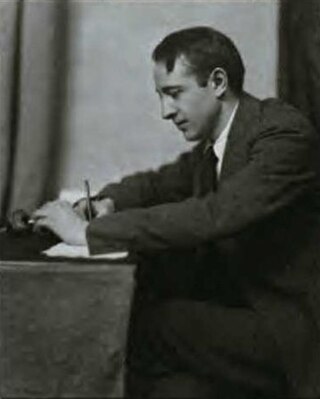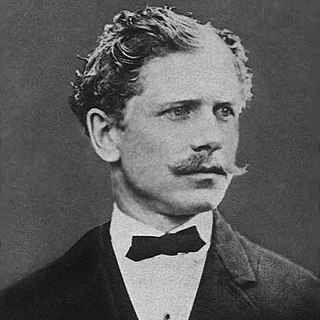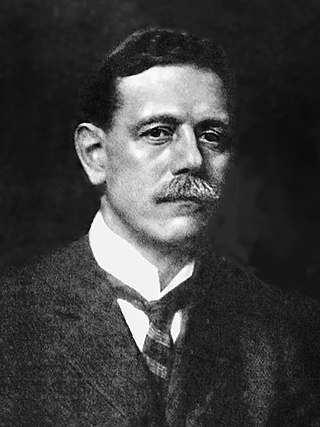Related Research Articles

Ralph Waldo Emerson, who went by his middle name Waldo, was an American essayist, lecturer, philosopher, abolitionist, and poet who led the Transcendentalist movement of the mid-19th century. He was seen as a champion of individualism and critical thinking, as well as a prescient critic of the countervailing pressures of society and conformity. Friedrich Nietzsche thought he was "the most gifted of the Americans," and Walt Whitman called Emerson his "master".

Saul Bellow was an American writer. For his literary work, Bellow was awarded the Pulitzer Prize, the 1976 Nobel Prize in Literature, and the National Medal of Arts. He is the only writer to win the National Book Award for Fiction three times, and he received the National Book Foundation's lifetime Medal for Distinguished Contribution to American Letters in 1990.

Yevgeny Ivanovich Zamyatin, sometimes anglicized as Eugene Zamyatin, was a Russian author of science fiction, philosophy, literary criticism, and political satire.

Richard Nathaniel Wright was an American author of novels, short stories, poems, and non-fiction. Much of his literature concerns racial themes, especially related to the plight of African Americans during the late 19th to mid 20th centuries suffering discrimination and violence. His best known works include the novella collection Uncle Tom's Children (1938), the novel Native Son (1940), and the memoir Black Boy (1945). Literary critics believe his work helped change race relations in the United States in the mid-20th century.

Anne Patricia Carson is a Canadian poet, essayist, translator, classicist, and professor.

Jonathan Earl Franzen is an American novelist and essayist. His 2001 novel The Corrections drew widespread critical acclaim, earned Franzen a National Book Award, was a Pulitzer Prize for Fiction finalist, earned a James Tait Black Memorial Prize, and was shortlisted for the International Dublin Literary Award. His novel Freedom (2010) garnered similar praise and led to an appearance on the cover of Time magazine alongside the headline "Great American Novelist". Franzen's latest novel Crossroads was published in 2021, and is the first in a projected trilogy.

George Santayana was a Spanish-American philosopher, essayist, poet, and novelist. Born in Spain, Santayana was raised and educated in the United States from the age of eight and identified as an American, yet always retained a valid Spanish passport. At the age of 48, he left his academic position at Harvard University and permanently returned to Europe; his last will was to be buried in the Spanish Pantheon in the Campo di Verano, Rome.

Jacques Martin Barzun was a French-born American historian known for his studies of the history of ideas and cultural history. He wrote about a wide range of subjects, including baseball, mystery novels, and classical music, and was also known as a philosopher of education. In the book Teacher in America (1945), Barzun influenced the training of schoolteachers in the United States.
Joseph Epstein is an American writer who was the editor of the magazine The American Scholar from 1975 to 1997. His essays and stories have appeared in books and other publications.

Haki R. Madhubuti is an African-American author, educator, and poet, as well as a publisher and operator of black-themed bookstore. He is particularly recognized in connection with the founding in 1967 of Third World Press, considered the oldest independent black publishing house in the United States.
Govind Vinayak Karandikar, better known as Vindā, was an Indian poet, writer, literary critic, and translator in the Marathi-language.

Blackwood's Magazine was a British magazine and miscellany printed between 1817 and 1980. It was founded by the publisher William Blackwood and was originally called the Edinburgh Monthly Magazine. The first number appeared in April 1817 under the editorship of Thomas Pringle and James Cleghorn. The journal was unsuccessful and Blackwood fired Pringle and Cleghorn and relaunched the journal as Blackwood's Edinburgh Magazine under his own editorship. The journal eventually adopted the shorter name and from the relaunch often referred to itself as Maga. The title page bore the image of George Buchanan, a 16th-century Scottish historian, religious and political thinker.

The Jewish Book Council, founded in 1943, is an American organization encouraging and contributing to Jewish literature. The goal of the council, as stated on its website, is "to promote the reading, writing and publishing of quality English language books of Jewish content in North America". The council sponsors the National Jewish Book Awards, the JBC Network, JBC Book Clubs, the Visiting Scribe series, and Jewish Book Month. It previously sponsored the Sami Rohr Prize for Jewish Literature. It publishes an annual literary journal called Paper Brigade.

Floyd James Dell was an American newspaper and magazine editor, literary critic, novelist, playwright, and poet. Dell has been called "one of the most flamboyant, versatile and influential American Men of Letters of the first third of the 20th Century." In Chicago, he was editor of the nationally syndicated Friday Literary Review. As editor and critic, Dell's influence is seen in the work of many major American writers from the first half of the 20th century. A lifelong poet, he was also a best-selling author, as well as a playwright whose hit Broadway comedy, Little Accident (1928), was made into a Hollywood movie.

Ambrose Gwinnett Bierce was an American short story writer, journalist, poet, and American Civil War veteran. His book The Devil's Dictionary was named one of "The 100 Greatest Masterpieces of American Literature" by the American Revolution Bicentennial Administration. His story "An Occurrence at Owl Creek Bridge" has been described as "one of the most famous and frequently anthologized stories in American literature", and his book Tales of Soldiers and Civilians was named by the Grolier Club one of the 100 most influential American books printed before 1900.
The Chicago Tribune Heartland Prize is a literary prize created in 1988 by the newspaper The Chicago Tribune. It is awarded yearly in two categories: Fiction and Nonfiction. These prizes are awarded to books that "reinforce and perpetuate the values of heartland America."

Irving Kane Pond was an American architect, college athlete, and author. Born in Ann Arbor, Michigan, Pond attended the University of Michigan and received a degree in civil engineering in 1879. He was a member of the first University of Michigan football team and scored the first touchdown in the school's history in May 1879.
The Caxton Club is a private social club and bibliophilic society founded in Chicago in 1895 to promote the book arts and the history of the book. To further its goals, the club holds monthly dinner meetings and luncheons, sponsors bibliophile events and exhibitions, and publishes books, exhibition catalogs, and a monthly journal, The Caxtonian. The Caxton Club is a member club of the Fellowship of American Bibliophilic Societies.

The Irving Literary Society was a literary society at Cornell University active from 1868 to 1887. The U.S. Bureau of Education described it as a "purely literary society" following the "traditions of the old literary societies of Eastern universities."

Laltluangliana Khiangte is a Mizo academic, playwright and poet of Mizo literature. He was the principal of the Serampore College and a former professor at Pachhunga University College and the North Eastern Hill University. He is presently serving as the senior most professor at the Department of Mizo at Mizoram University. He is a recipient of the Pu Buanga Award, the highest literary award of the Mizo Academy of Letters. The Government of India awarded him the fourth highest civilian honour of the Padma Shri, in 2006, for his contributions to Indian literature.
References
- ↑ Liebenson, Donald. "Chicago Literary Club celebrates 140 years of intellectual pursuit". Chicago Tribune. Retrieved 14 October 2015.
- ↑ "The Chicago Literary Club" . Retrieved 14 October 2015.
- 1 2 Frevert, Rhonda Huber. "Clubs, Literary". Encyclopedia of Chicago. Retrieved 14 October 2015.